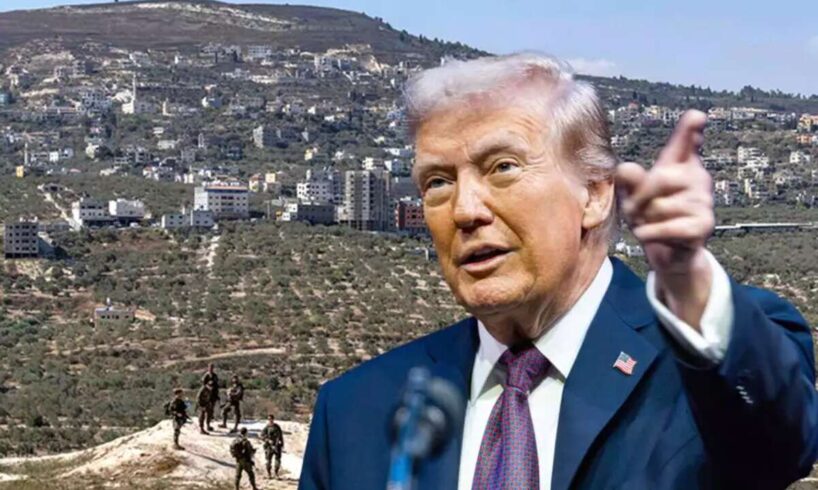
The American plan for the day after the war includes, according to several American and Arab sources, sweeping changes in Judea and Samaria, under Palestinian Authority control. Among them: eliminating refugee status in the camps, rehabilitating them, and ending UNRWA’s activity there.
This is part of the broader American initiative for the Middle East, centered on conflict resolution, particularly the Israeli-Palestinian conflict. Details obtained by Israel Hayom indicate the plan envisions turning all the refugee camps in Judea and Samariainto “ordinary” neighborhoods and abolishing their residents’ refugee status.
US President Donald Trump addresses the UN General Assembly in New York, Tuesday. Photo: Reuters Reuters
Other elements include shutting down UNRWA’s activities, deep structural reforms within the Palestinian Authority, major changes to its education system as part of a de-radicalization process, expanding that process to the broader population, and banning incitement. Gulf states are expected to commit to significant investments in the Palestinian Authority, but only if it implements the reforms and commitments.
An Arab diplomatic source told Israel Hayom that the practical effect would be integrating the Palestinians into the Abraham Accords, though a long process lies ahead before investments and reconstruction materialize. According to the source, the Palestinian Authority has agreed to these moves, with President Mahmoud Abbas’ recent UN speech seen as a major step in that direction. Abbas conditioned his agreement on the Authority being involved in Gaza’s rehabilitation and control from the first stage, a point still under dispute. The Americans are willing to give the Authority a foothold, but Israel remains completely opposed.
Not a Palestinian state
An American diplomat said that any US approval of Israeli sovereignty over parts of the West Bank would torpedo the entire plan and that Israeli leaders must carefully weigh its advantages. He said the plan offers a real opportunity to stabilize the region for years to come.
Asked whether the plan paves the way for a Palestinian state, the diplomat replied: “Not at this stage.” Israel’s formal response will be given Monday at Prime Minister Benjamin Netanyahu’s meeting with President Donald Trump.
Benjamin Netanyahu during his speech to the UN General Assembly. Photo: AP AP
An Israeli diplomat said Israel would likely adopt the plan, since many of its clauses reflect longstanding Israeli demands, but would seek clarifications on issues such as the stages of an Israeli withdrawal and the Palestinian Authority’s involvement in Gaza’s rehabilitation and governance. In his Friday speech to the UN General Assembly, Netanyahu reiterated Israel’s opposition to a Palestinian state and to handing control of Gaza to the Palestinian Authority.
Message to Saudi Arabia
Representatives of the Saudi delegation were present in the hall during Netanyahu’s speech. The prime minister also criticized Abbas, saying: “Abu Mazen must stop spreading antisemitic conspiracies against Israel. The Palestinian Authority must stop paying terrorists for murdering Jews.”
On Iran, Netanyahu said: “Iran will do everything it can to sabotage this historic peace. Sanctions must be reimposed on Iran. The Western world needs to change its approach.”
Benjamin Netanyahu and Saudi Crown Prince Mohammed bin Salman. Photo: AFP, Reuters AFP, Reuters
He struck a more optimistic note on Saudi Arabia: “We stand on the threshold of historic peace between Israel and Saudi Arabia. This will help bring the Arab-Israeli conflict to an end and boost the chances of peace between Israelis and Palestinians.” The Saudi delegation remained in the hall for Netanyahu’s speech. He linked the Palestinian issue to Saudi Arabia: “I tried to make peace with the Palestinians. They should be part of it, but they cannot be allowed to veto the process.”
Over the weekend, Netanyahu met with Emirati Foreign Minister Sheikh Abdullah bin Zayed Al Nahyan. According to Emirati media, the minister stressed the need “to end the bloody war in Gaza, reach a permanent cease-fire, prevent further loss of life, and resolve the tragic crisis in Gaza,” and said the UAE would “support international efforts to secure the release of all hostages.”
Anwar Gargash, an adviser to the Emirati president, wrote on X that the meeting “reflects a courageous step in support of international efforts to end the war in Gaza, achieve a lasting cease-fire that will end the humanitarian tragedy, and strengthen the peace process.”
The 21-Point plan
On Friday, Trump voiced optimism about ending the war through the American plan, known as the “21-point plan.” He also made clear he would not allow Israel to annex the West Bank. “I won’t let them. This has to end,” Trump said.
Different versions of the plan have circulated, some contradictory, but its main points reportedly include: a permanent cease-fire; the release of all hostages in the first days; the release of thousands of prisoners; a gradual withdrawal of the Israel Defense Forces from Gaza; security control by a multinational force with Palestinian participation under UN sponsorship, alongside Arab states; massive humanitarian aid deliveries; removing Hamas from power in Gaza, including handing over all its weapons; a reconstruction process managed by an international body with major American and Gulf involvement; and limited Palestinian Authority involvement in that process.





